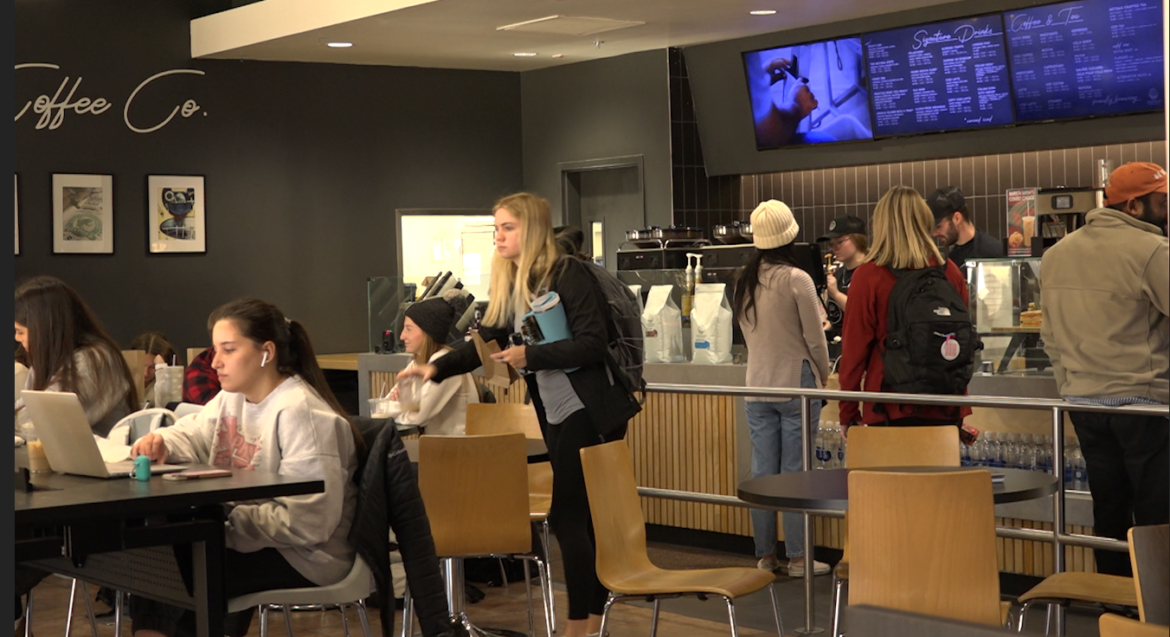By: Philip Jackman
FAYETTEVILLE, Ark. (UATV)— For many of us, we start the day off with a cup of coffee or two cups. Some people will then have a couple of energy drinks later in the day and finally end off with a soda at dinner. This is an example of caffeine overconsumption.
Caffeine overconsumption is when someone consumes more caffeine than the amount that they’re recommended. There are differing factors for how much an individual should consume each day, but for a healthy adult, it is recommended that you consume no more than 400 mg a day.
Mallori Roberts a human nutrition instructor at the University of Arkansas and a registered dietitian said that there are some side effects to consuming too much caffeine
“increased headaches, irritability, lack of sleep, insomnia, and increased heart rate.”
For a lot of students in college, caffeine consumption is as a part of their day as going to class. They will drink coffee, energy drinks, sodas, alcohol with soda, or energy drinks. They can’t do much without having some sort of caffeine.
Dylan Stewart a student at the University of Arkansas said “I drink coffee all day, even until I go to bed.”
There are many students like Dylan around college campuses they might not all drink coffee, but they consume way more than their recommended amount.
Another student Adolfo Hernandez deals with a caffeine dependency and he describes how he relies on caffeine to get through his day.
“coffee I try to have two cups a day, it helps me get through the day. Sometimes I have four, sometimes I lose count. Depends on how busy the day is, but it definitely gets me through things.”
A lot of students use caffeine as a crutch to help them get through their day-to-day lives. For them not only will they feel sick if they don’t have their caffeine, but they will also mentally feel like can’t cope without any coffee or energy drinks.
Mallori Roberts said that a lot of students get caught in a difficult series of events, where they are tired one day and then they have either too much caffeine or they have caffeine too late in the day.
“You end up not being able to sleep potentially because you consumed too much caffeine, but maybe later in the day. A side effect would be that you would not be able to go to sleep that night. So when early classes come the next morning or commitments you’ve made so you have to get up early then you are not getting enough sleep and the cycle continues.”
Roberts also warns that when you are consuming caffeine you need to be careful and aware if you might have any heart conditions. For some people with heart conditions, too much caffeine can be dangerous even deadly.
Some people can push their heart past its limit by consuming too much caffeine. One example of this is a recent event that happened at Panera Bread.
In this instance, the person had a heart condition and drank too much caffeine and ended up dying. This is not an uncommon occurrence as heart disease is the most common way of death in the United States
Since heart disease is so prevalent and could be dangerous when combined with caffeine. Mallori Roberts offers some advice for possible ways to avoid depending on caffeine.
“Exercise is a great something to incorporate into daily activities. I think to social interactions so finding something that you enjoy being involved in. I think setting priorities, that means like prioritizing classwork or potentially your work during the day time hours so that when the night comes you can go to bed instead of starting those activities like studying late in the evening hours.”
Caffeine can be a large part of everyone’s day, but it can also have drawbacks. It is important to avoid too much caffeine and to try and find other ways to fill the gap that the caffeine takes.


